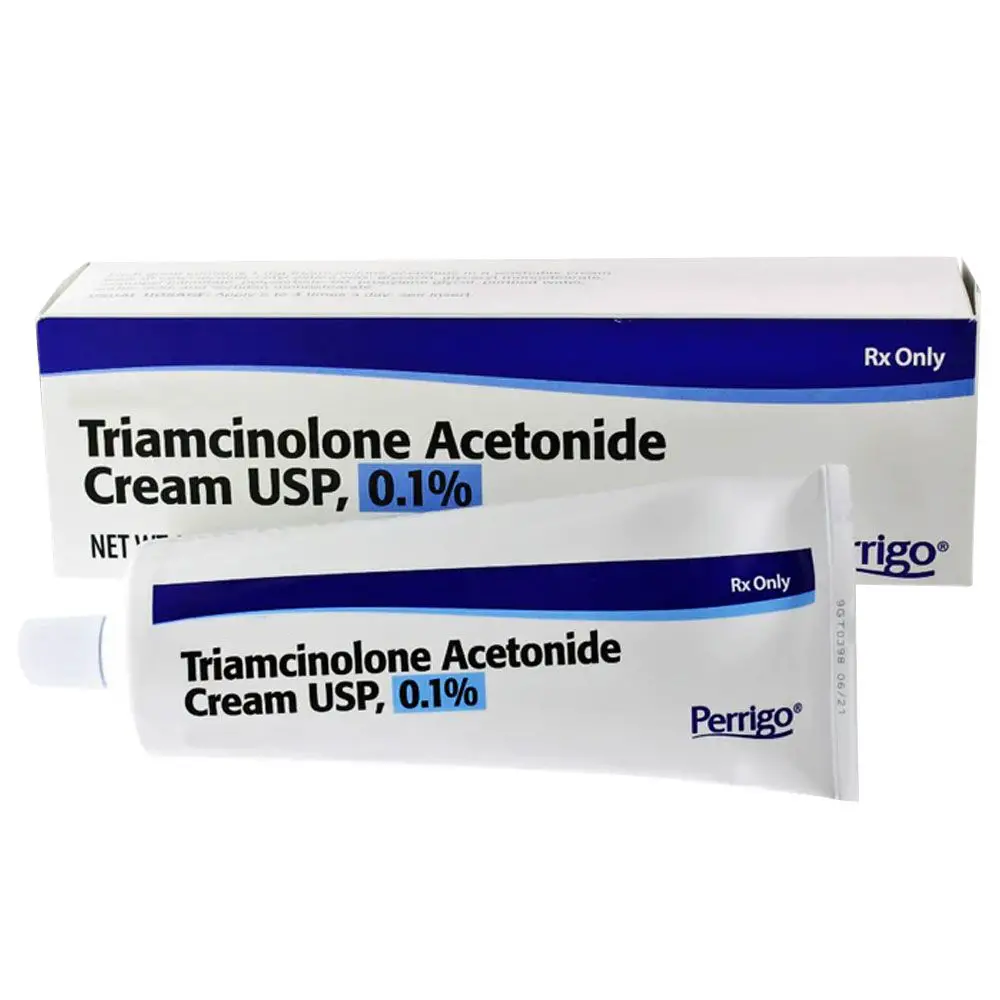Table of Contents
In pharmacology and healthcare, one frequently asked question pertains to the accessibility of certain drugs over-the-counter (OTC) without a doctor’s prescription. Whether you can buy Triamcinolone Acetonide over the counter is often raised. To fully comprehend this, we must delve into what Triamcinolone Acetonide is, how it functions, why it’s a prescription medication, and the implications of its availability status.
What is Triamcinolone Acetonide?
Triamcinolone acetone is a corticosteroid medication specifically classified as a synthetic glucocorticoid. Corticosteroids are a category of drugs that mirror the action of naturally occurring hormones in our adrenal glands. They are widely utilized for their anti-inflammatory and immune-suppressing properties.

Triamcinolone acetone is available in various forms, including creams, ointments, lotions, sprays, and injections. This medication is often used to treat skin conditions such as eczema, dermatitis, allergies, and rash. In its injectable form, it treats various conditions, including allergic disorders, arthritis, blood diseases, breathing problems, certain cancers, eye diseases, intestinal disorders, and skin diseases.
This medication functions by inhibiting the substances in the body that cause inflammation, thereby alleviating associated symptoms like swelling, itching, and redness. Specifically, it acts on the immune system to help reduce inflammation by preventing the release of substances that cause inflammation.
Can You Buy Triamcinolone Acetonide Over the Counter?
You can not buy Triamcinolone Acetonide over the counter because all corticosteroid medicines (cortisone-like or steroid) can only be purchased as prescription medication.
Triamcinolone acetonide is a potent corticosteroid medication used to treat various inflammatory conditions, such as skin disorders, allergies, and joint inflammation. It cannot be purchased over the counter due to its potential side effects and the need for proper medical supervision.
Usually, Original Medicare (Part A and Part B) and Medicare Advantage plans (Part C) can cover cortisone injections and Triamcinolone Acetonide for pain relief and arthritis.
Corticosteroids, including Triamcinolone Acetonide, are potent medications that can significantly affect the body. They work by suppressing the immune system and reducing inflammation. While they can be highly effective in treating specific conditions, they also considerably carry the risk of side effects when misused or without proper medical guidance.
Some of the potential side effects of corticosteroids include:
- Increased risk of infections: Corticosteroids can weaken the immune system, making individuals more susceptible to infections.
- Skin thinning and fragility: Long-term or excessive use of corticosteroids can lead to skin thinning and an increased risk of skin tearing or bruising.
- Adrenal suppression: Prolonged use of corticosteroids can suppress the function of the adrenal glands, which produce natural corticosteroids in the body. Abruptly stopping the medication can also cause temporary adrenal insufficiency.
- Bone loss: Corticosteroids can contribute to bone loss, increasing the risk of osteoporosis and fractures, especially with long-term use.
- Fluid retention and increased blood pressure: Corticosteroids can cause fluid retention, which can lead to swelling and increased blood pressure.
Given these potential side effects and the need for proper dosing, monitoring, and medical supervision, corticosteroids like Triamcinolone Acetonide are classified as prescription medications. A healthcare professional, such as a doctor or a dermatologist, is best equipped to assess an individual’s condition, determine the appropriate dosage, and monitor the treatment’s effectiveness and any potential side effects. This ensures the medication is used safely and effectively to achieve the desired therapeutic outcomes while minimizing the risks.
Why is Triamcinolone Acetonide a Prescription Medication?
The primary reason why Triamcinolone Acetonide is a prescription medication is due to its full strength and the potential side effects that could arise with misuse or overuse. The prescription-only status allows healthcare professionals to monitor its use closely and ensure it is used safely and effectively. This supervision is crucial for a potent corticosteroid like Triamcinolone Acetonide because long-term or improper use can lead to severe side effects.
Side effects can range from mild to severe, depending on the dosage and length of treatment. Mild side effects may include burning, itching, irritation, or skin dryness. More severe side effects could include mood changes, trouble sleeping, weight gain, puffiness in the face, or blood sugar changes, mainly when used for a long time or over a large area of the skin. Side effects can be even more significant in its injectable form, including allergic reactions or endocrine dysfunction.
The Implications of Over-the-Counter Availability
If potent medications like Triamcinolone Acetonide were readily available OTC, there could be a high risk of misuse and adverse health consequences. An essential function of the healthcare system is to mitigate these risks by controlling the distribution of potentially harmful drugs. Triamcinolone acetone’s availability is restricted to ensure it’s administered under the guidance of a qualified healthcare professional who can monitor the patient’s condition and adjust the dosage accordingly.
Moreover, the doctor can educate the patient about the potential side effects and signs of overuse or misuse, providing additional safety measures that wouldn’t be available if the medication were sold OTC.
Conclusion
Triamcinolone acetone, a potent corticosteroid medication, is not available over the counter in the United States due to its strength and potential side effects. This restriction is designed to safeguard patients and ensure that the medication is used correctly and effectively under the supervision of a healthcare professional. While this may initially seem inconvenient, it is an important safety measure in the overall context of patient health and well-being. As with any medication, it’s crucial to use it under the guidance of a healthcare provider to reap the most benefits and minimize potential risks.
